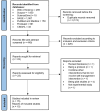The Impact of Self-Management Interventions on Behavioral and Clinical Outcomes in Individuals with Systemic Lupus Erythematosus: A Systematic Review of Empirical Evidence From 2003-2024
- PMID: 40548206
- PMCID: PMC12182245
- DOI: 10.2147/PPA.S521546
The Impact of Self-Management Interventions on Behavioral and Clinical Outcomes in Individuals with Systemic Lupus Erythematosus: A Systematic Review of Empirical Evidence From 2003-2024
Abstract
Aim: To evaluate and synthesize evidence on the impact of self-management interventions in improving behavioral and clinical outcomes among individuals with systemic lupus erythematosus (SLE).
Methods: A comprehensive search was conducted across eight electronic databases-CINAHL Plus with Full Text, ProQuest, PubMed, Medline with Full Text, SAGE, ScienceDirect, Scopus, and Web of Science-to identify studies published from inception to 2024. Randomized controlled trials and quasi-experimental studies assessing self-management interventions in individuals with SLE were included. Methodological quality was evaluated using the Joanna Briggs Institute critical appraisal tools. Data synthesis followed a convergent integrated analysis framework to identify recurring themes and subthemes.
Results: A total of 15 studies met the inclusion criteria, consisting of 10 randomized controlled trials (66.67%) and 5 quasi-experimental studies (33.33%). The interventions targeted physical, mental, and behavioral health through various strategies. The most common interventions included counseling and education (7 studies, 22.58%), followed by physical activity programs (2 studies, 6.45%), and self-management sessions (2 studies, 6.45%). Other interventions, such as cognitive-behavioral therapy, strengthening exercises, and digital health tools, were also implemented. In-person interventions (46.67%) were the most common delivery format, followed by digital platforms (26.67%). Self-management interventions led to significant improvements in physical health (eg, reduced fatigue and improved functional capacity), mental health (eg, reduced anxiety and depression), and health behaviors (eg, enhanced adherence to treatment and self-care practices). Furthermore, the interventions contributed to an improved quality of life by addressing the physical, psychological, and social challenges faced by individuals with SLE.
Conclusion: Self-management interventions positively impact behavioral and clinical outcomes in individuals with SLE. Future research should explore long-term sustainability, integration of digital health strategies, and personalized approaches. Expanding access to self-management programs, particularly in low-resource settings, may further enhance outcomes for individuals with SLE.
Keywords: intervention; self-management; systematic review; systemic lupus erythematosus.
© 2025 Hanrop et al.
Conflict of interest statement
No potential conflict of interest was reported by the authors.
Figures
Similar articles
-
Computer and mobile technology interventions for self-management in chronic obstructive pulmonary disease.Cochrane Database Syst Rev. 2017 May 23;5(5):CD011425. doi: 10.1002/14651858.CD011425.pub2. Cochrane Database Syst Rev. 2017. PMID: 28535331 Free PMC article.
-
Effectiveness of family interventions on psychological distress and expressed emotion in family members of individuals diagnosed with first-episode psychosis: a systematic review.JBI Database System Rev Implement Rep. 2017 Apr;15(4):1057-1079. doi: 10.11124/JBISRIR-2017-003361. JBI Database System Rev Implement Rep. 2017. PMID: 28398985
-
Music interventions for improving psychological and physical outcomes in people with cancer.Cochrane Database Syst Rev. 2021 Oct 12;10(10):CD006911. doi: 10.1002/14651858.CD006911.pub4. Cochrane Database Syst Rev. 2021. PMID: 34637527 Free PMC article.
-
Exercise interventions and patient beliefs for people with hip, knee or hip and knee osteoarthritis: a mixed methods review.Cochrane Database Syst Rev. 2018 Apr 17;4(4):CD010842. doi: 10.1002/14651858.CD010842.pub2. Cochrane Database Syst Rev. 2018. PMID: 29664187 Free PMC article.
-
Behavioral interventions to reduce risk for sexual transmission of HIV among men who have sex with men.Cochrane Database Syst Rev. 2008 Jul 16;(3):CD001230. doi: 10.1002/14651858.CD001230.pub2. Cochrane Database Syst Rev. 2008. PMID: 18646068
References
Publication types
LinkOut - more resources
Full Text Sources
Miscellaneous



